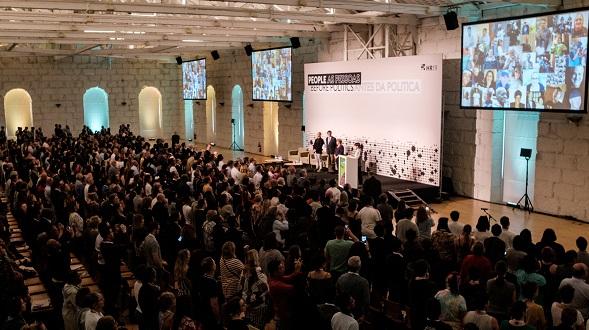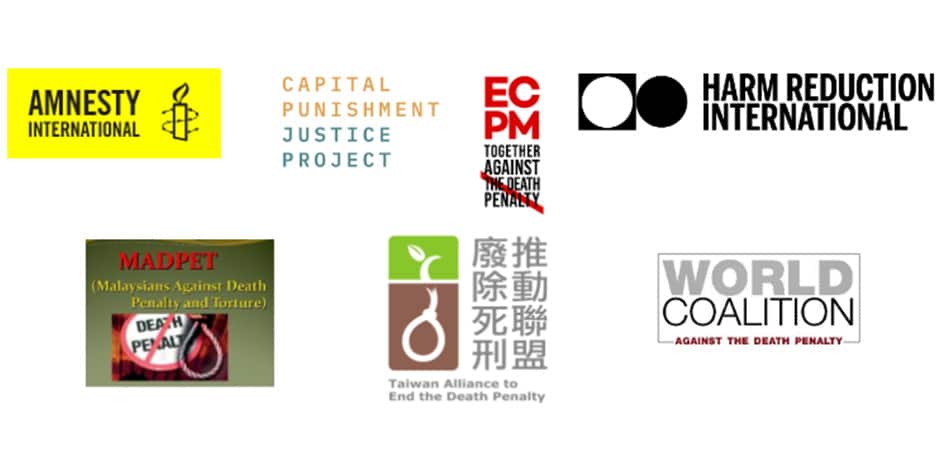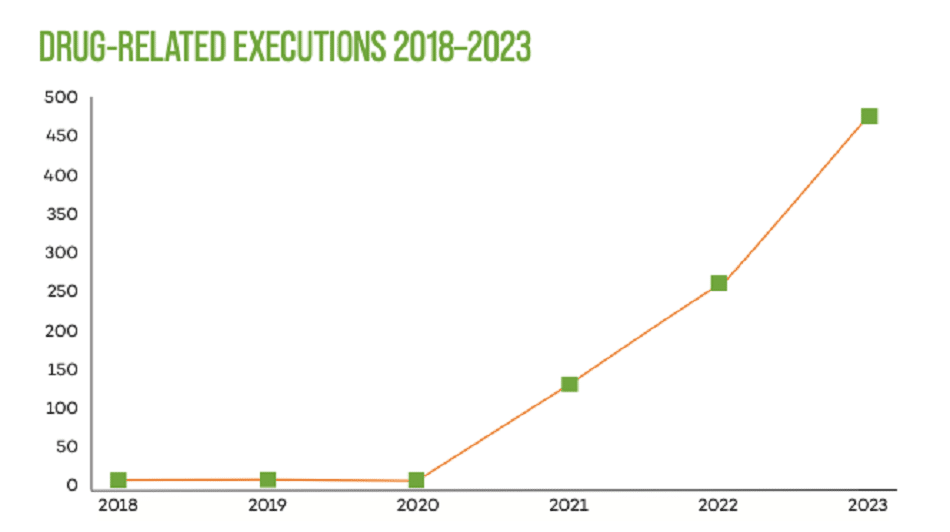
Drug policy reform, harm reduction movement and the death penalty abolition movement have much in common
26 June is an interesting date for the death penalty abolition movement: it is International Day Against Drug Abuse and Illicit Trafficking, and some countries use it to execute people for drug related offenses, such as China and maybe this year, Sri Lanka. To counter that narrative, the International Drug Policy Consortium as made 26 June a Global Day of Action: “Support. Don’t Punish”, to “reclaim and shift that day’s narrative”. But 26 June is also International Day in Support of Victims of Torture, an equally important day for human rights activists and the death penalty abolition movement.
At a Crossroads
As Naomi Burke-Shyne, Executive Director of Harm Reduction International opened the HR19 conference, she mentioned the death penalty for drug-related offenses and HRI’s latest publication on this subject: “at least 35 countries retain the death penalty for drug offences in law, although UN experts have repeated time and again that it is a clear violation of international human rights law”. Michelle Bachelet, UN High Commissioner for Human Rights concurred in her keynote speech: “I remain concerned about the continuing use of capital punishment for drug offenses in a number of States, and moves towards its re-introduction in others. (…) We strongly recommend States amend their penal codes and no longer impose the death sentence for any crimes, including for drug-related offences.”
During the 2nd Plenary session on Drugs and Beyond: Upholding Human Rights, Sarah Belal, Justice Project Pakistan, presented the plight of Pakistani migrant workers sentenced to death in Saudi Arabia and the inspirational methodology of Justice Project Pakistan to free them: litigation, communication and advocacy. In February 2019, 2000 Pakistani prisoners were released from Saudi jails.
In the roundtables focusing on Rogue States: The Death Penalty For Drugs, Giada Girelli, Harm Reduction International explained why it was important that the harm reduction movement cares about the death penalty. In 2018, executions for drug offences were carried out in China, Iran, Sau-di Arabia, Singapore and Vietnam. At least 7,000 people are on death row for drug offenses around the world. While there is a stark decrease in drug-related executions over the last 10 years, other events in 2018 show that for every progressive step, there is a regressive counter-narrative. In Bang-ladesh and Sri Lanka, populist rhetoric against the ‘threat’ of the ‘drugs menace’ has seen leaders push for expansion or re-implementation of the death penalty, while governments in the Philippines and United States (among others) pointed to capital punishment as an essential tool to confront drug trafficking or public health emergencies.
Y.S.R. Murthy from Jindal Global University insisted on the role of NHRIs and encouraged civil society to work with them, for example in the Philippines and in Sri Lanka. Aurelie Placais, World Coalition Against the Death Penalty presented stories of women facing the death penalty for drug related offenses in Iran, Indonesia, insisting on the specific discrimination they face in criminal justice systems focusing on a punitive approach to drug. Julian McMahon, Capital Punishment Justice Project, discussed how to make change: “we need to feed the debate with facts and truth, we need interdisciplinary, cross barriers, and to work together”.
Participants from Sri Lanka also took the floor and indicated that with the elections taking place at the end of 2019, the death penalty was considered as an alternative to mass incarceration. The case of the Philippines was also debated during the conference, with information that the number of extrajudicial executions had reached 30 000. Another participants informed panellists that the 1st Asia Regional Meeting of the International Society for the Study of Drug Policy will be held at the University of Hong Kong from 14 -15 October 2019, and that one of the panel will be on the death penalty.
Progress made with the UNODC
Since the 2015 World Day Against the Death Penalty focusing on “the death penalty doesn’t stop drug crimes”, and the UNGASS on drugs in 2016, some progress have been made. The High Level Ministerial segment and the Commission on Narcotic Drugs which took place in March 2019, have generated intense debates on the death penalty in Vienna, but the UN common position is a good sign that things are changing from within.
Zaved Mahmood, OHCHR, explained the irrelevance of the death penalty in the three drug conventions and quoted the UN system common position on international drug control policy through effective inter-agency cooperation: “to promote the principle of proportionality, to address prison overcrowding and overincarceration by people accused of drug crimes, to support implementation of effective criminal justice responses that ensure legal guarantees and due process safeguards pertaining to criminal justice proceedings and ensure timely access to legal aid and the right to a fair trial, and to support practical measures to prohibit arbitrary arrest and detention and torture”.
Earlier this year, the World Coalition Against the Death Penalty has joined the International Drug Policy Consortium and attended its first members meeting as a side event of HR19. It was striking to witness the many similarities with the World Congress Against the Death Penalty and the General Assembly of the World Coalition in February. The two movements have indeed much in common and need to work more hand in hand.
Categories
Drug Offenses






